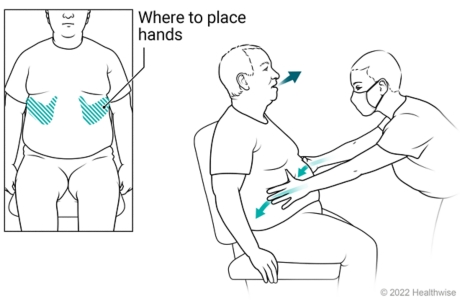Patient Education
Our Health Library information does not replace the advice of a doctor. Please be advised that this information is made available to assist our patients to learn more about their health. Our providers may not see and/or treat all topics found herein.
Topic Contents
Spinal Cord Injury: Costophrenic Assist (Assisted Cough)
Getting Started
A strong cough is important to help clear the lungs of mucus. If you have a weak cough or a lot of mucus, you may need an assisted cough.
In a costophrenic assist, another person pushes on your rib cage to help you cough. This is done while you are sitting up in a bed or chair. If you're in a wheelchair, be sure to set the brakes and use the seat belt. Wait 30 minutes after a meal before you do an assisted cough.
Use these steps to do a costophrenic assist.

- Your caregiver places their hands on the lowest part of your rib cage, with their fingers wrapped around your sides and their thumbs pointing toward the center of your chest.
- You take a deep breath and hold it until the caregiver tells you to cough.
- When you cough, the caregiver quickly and firmly squeezes your ribs, pushing down and in and holding for 3 seconds. It may take practice to coordinate your cough with the motion.
Talk to your doctor before trying this. Some people shouldn't try an assisted cough. This may include those who:
- Are in pain.
- Have a chest or back injury, such as an unstable spinal injury or a broken rib.
- Had recent surgery.
- Have osteoporosis.
- Are pregnant.
Related Information
Credits
Current as of: September 29, 2025
Author: Ignite Healthwise, LLC Staff
Clinical Review Board
All Ignite Healthwise, LLC education is reviewed by a team that includes physicians, nurses, advanced practitioners, registered dieticians, and other healthcare professionals.
Current as of: September 29, 2025
Author: Ignite Healthwise, LLC Staff
Clinical Review Board
All Ignite Healthwise, LLC education is reviewed by a team that includes physicians, nurses, advanced practitioners, registered dieticians, and other healthcare professionals.
This information does not replace the advice of a doctor. Ignite Healthwise, LLC disclaims any warranty or liability for your use of this information. Your use of this information means that you agree to the Terms of Use and Privacy Policy. Learn how we develop our content.
To learn more about Ignite Healthwise, LLC, visit webmdignite.com.
© 2024-2026 Ignite Healthwise, LLC.


